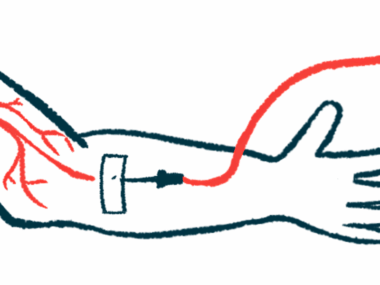Retroviral agents for HIV may have caused MG in woman: Case report
Patient successfully treated after diagnosis of anti-MuSK positive MG
Written by |

A 44-year-old woman positive for the human immunodeficiency virus (HIV) developed myasthenia gravis (MG) after receiving treatment with antiretroviral agents.
While no clear guidelines exist for treating MG in HIV-infected patients, researchers noted the woman was successfully treated with prednisone, azathioprine, and plasma exchange. According to them, this approach “resulted in improvement of her clinical signs of MG without affecting HIV.”
Yet, they noted that “further real-life data or larger case series are needed to clarify the best medical regimen in these situations.”
Her case was described in the study, “MuSK myasthenia gravis as a manifestation of immune reconstitution inflammatory syndrome in an HIV-positive patient: a challenging diagnosis and therapeutic approach,” which was published as a letter to the editor in the journal Neurological Sciences.
MG is caused by the immune system attacking certain proteins found at the neuromuscular junction, the site where nerve and muscle cells communicate. About 6% of all MG cases are caused by antibodies targeting the muscle-specific kinase (MuSK) protein.
Here, a team of researchers in Italy described the case of a 44-year-old HIV-positive woman who developed anti-MuSK positive MG after being treated with antiretroviral agents.
The woman tested positive for HIV in 2010, at the age of 31, and was immediately treated with a combination of highly active antiretroviral therapies (HAART).
However, she failed to comply with treatment, as shown by her persistently high viral loads and low number of CD4-positive T-cells, an indicator of impaired immune function in HIV patients.
The HAART regimen was then changed and, in 2015, her HIV viral load became undetectable. Despite a slow recovery, her CD4-positive T-cell counts remained stable.
Three years later, during a follow-up visit, her treatment regimen consisted on a combination of three retrovirals: tenofovir, emtricitabine, and darunavir. Her HIV load was undetectable and her CD4-positive T-cell counts had increased by about 255%.
Since then, the patient missed most of her follow-up consultations to monitor her HIV status.
Symptoms included muscle weakness, difficulty swallowing and raising head
In September 2019, she started to experience progressive muscle weakness, evidenced by eyelid droopiness, blurred vision, double vision, and voice changes. She also had difficulty swallowing and raising her head.
Her CD4-positive T-cell counts were stable and no abnormalities were found in a brain MRI scan. She was then referred to a neurological consultation, and after several tests she was admitted to the neurologic clinic.
She underwent an electromyography, a procedure used to evaluate the way muscles respond to stimulation. The electromyography performed with repetitive nerve stimulation confirmed a decrease in muscle response, suggestive of MG.
Follow-up blood work revealed the presence of circulating anti-MuSK antibodies, confirming the diagnosis of anti-MuSK positive MG.
She began treatment with prednisone, a steroid, which was given daily, but her response was poor. She then received two cycles of intravenous immunoglobulin (IVIG), which also led to limited responses. In IVIG, immune proteins collected from healthy donors are infused directly into a patient’s bloodstream in an attempt to neutralize and promote the elimination of autoantibodies.
At her follow-up consultation, conducted in March 2021, she complained of severe swallowing difficulties. She also had lost weight, around 40 kilograms (about 88 pounds), and experienced shortness of breath on minor exertion.
Plasma exchange needed
Due to her clinical deterioration, she underwent two sessions of plasma exchange — a process that involves replacing a person’s plasma, the liquid part of blood, and that can help clear autoantibodies in circulation.
After two months, she also began treatment with the immunosuppressant azathioprine along with prednisone. She still was following the same treatment at her most recent follow-up in January.
During these two years, blood work came back normal. Her MG was under control, along with her HIV viral load, which remained undetectable. Her CD4-positive T-cell counts also were close to normal.
According to researchers, in the case of this patient, MG developed in the context of a condition called immune reconstitution inflammatory syndrome (IRIS), which can arise following treatment with retroviral agents for HIV. IRIS occurs when the immune system suddenly becomes stronger as a result of treatment, causing an exaggerated inflammatory reaction.
This case shows how “it is important that HIV specialists are aware of the possibility that, in the context of immune reconstitution syndromes mediated by HAART, patients may develop rare and belated neuromuscular diseases difficult to recognize, such as anti-MuSK MG,” the researchers wrote.
“A prompt referral to specialist neurology clinic may help shorten the diagnostic delay, institute adequate immune treatment with better outcomes avoiding complications of the disease,” they wrote.




Leave a comment
Fill in the required fields to post. Your email address will not be published.